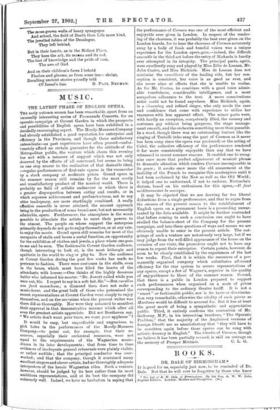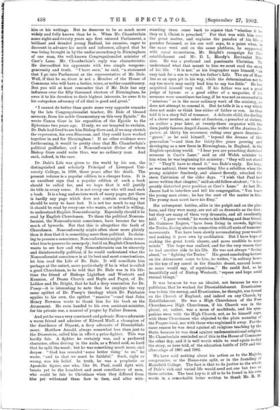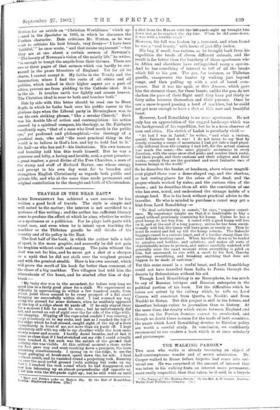BOOKS.
DR. DALE OF BIRMINGHAM.* IT is good for us, especially just now, to be reminded of Dr. Dale. Not that be will ever be forgotten by those who knew
• The Life of EL W. Dal., of Birmingham. By bin Soa, A. W. W. Dale. Popular Edition. London : fodder and Stoughton. [ss.]
him or his writings. But he deserves to be so much more widely and fully known than he is. When Mr. Chamberlain some eight-and-twenty years ago first entered Parliament, a brilliant and dreaded young Radical, his enemies, eager to discount in advance his merit and influence, alleged that he was being brought in by the undue ascendency in Birmingham of one man, the well-known Congregationalist minister of Carr's Lane. Mr. Chamberlain's reply was characteristic. He discomfited his opponents with two simple weapons : generosity and truth. "I have seen," he said, "-a statement that I go into Parliament as the representative of Mr. Dale. Well, if that be so, there is not a Member of the House of Commons who will have a better, wiser, or nobler constituency. But you will at least remember that if Mr. Dale has any influence over the fifty thousand electors of Birmingham, he owes it to his devotion to their highest interests, he owes it to his outspoken advocacy of all that is good and great."
"I cannot do better than quote some very apposite remarks by the late Congregationalist teacher, Dr. Dale of blessed memory, from his noble Commentary on this very Epistle." So wrote Canon Gore in his exposition of the Epistle to the Ephesians two years ago. If only, we are tempted to exclaim, Dr. Dale had lived to see him Bishop Gore and, if we may stretch the expression, his own Diocesan, and they could have worked together in and for Birmingham ! If no other evidence were forthcoming, it would be pretty clear that Mr. Chamberlain's political godfather, and a Nonconformist divine of whom Bishop Gore could write thus, was no ordinary man. And such, indeed, is the case.
Dr. Dale's Life was given to the world by his son, the distinguished and scholarly Principal of Liverpool Uni- versity College, in 1898, three years after his death. The present volume is a popular edition in a cheaper form. It is an excellent sign that a popular edition of such a book should be called for, and we hope that it will justify its title in every sense. It is not every one who will read such a book. It is a long and serious work of many pages, yet there is hardly any page which does not contain something we should be sorry to have lost. It is not too much to say that it should be read by every one who wants, or indeed is willing, to understand English Nonconformity. Especially should it be read by English Churchmen. To them the political Noncon- ferraist, the Nonconformist conscience, have become far too much of bywords. Not that this is altogether the fault of Churchmen. Nonconformity might often show more plainly than it does that it is something more than political. In claim- ing to possess a conscience, Nonconformists might claim some- what less to possess its monopoly; but if an English Churchman wants to see how and why Nonconformists can be sincerely and disinterestedly political, if he would understand what the Nonconformist conscience is at its best and most conscientious, let .him read the Life of Dr. Dale. It will conciliate him perhaps at the outset, more particularly if he is what is called a good Churchman, to be told that Dr. Dale was in his life- time the friend of Bishops Lightfoot and Westcott and Kennion, of Deans Church and Boyle and Paget, of Dr. Liddon and Dr. Bright, that he had a deep veneration for Dr. Pusey—it is interesting to note that he employs the very same epithet of Dr. Pusey's theology which Dr. Fairbairn applies to his own, the epithet "massive "—and that John Henry Newman wrote to thank him for his book on the Atonement. He even handed to his own assistant-minister, for his private use, a manual of prayer by Father Benson.
And yet he was a very convinced and polemic Nonco nformisto a warm friend and admirer of Edward Miall, a champion of the dissidence of Dissent, a fiery advocate of Disestablish- merit. Matthew Arnold, always somewhat less than just to the Dissenters, called him in effect a prize-fighter. This was hardly fair. A fighter he certainly was, and a perfervid character, often driving in the nails, as a friend said, so hard that he split the wood ; but he was something much more, and deeper. " God has revealed . some better thing' to us," he wrote, "and to that we must be faithful." Such, right or wrong, was his belief. In truth, he was a prophetic or Apostolic figure, one who, like St. Paul, could fight with beasts yet be the humblest and most conciliatory of men, who could be fair to Christians when they differed from hint yet withstand them face to face, and after with-
standing them come back to rejoice that "whether it be
they or I, Christ is preached." For that was with him ever the great matter, and explains the paradox of his life, a paradox focussed, as his son well says, to a point when, in the same week and on the same platform, he supported, with equal earnestness,. Mr. Bright's campaign for Dis- establishment and Mr. D. L. Moody's Revivalist Mis- sion. He was a profound and passionate Christian. To understand what that meant to him we must read the story of his life. " It is not," as his biographer says himself, " an easy task for a son to write his father's Life. The sin of Ham lies as an open pit in his way, while the determination not to say too much may easily lead him to say too little." He has acquitted himself very well. If his father was not a good judge of hymns or a good editor of a magazine, if his sermons were sometimes too long, if he was not as successful in " missions " as in the more ordinary work of the ministry, be does not attempt to conceal it. But he tells it in a way which does not make us think less either of father or son. As thus told it is a story full of romance. A delicate child, the darling of a clever mother, an usher at fourteen, a preacher at sixteen, an author a year later, at twenty-three co-pastor with the then justly famous Angell James, the writer of the Anxious in- quirer, at thirty his successor, ruling over grave deacons- " grave," as he said himself, " beyond the dreams of this generation "—and then for thirty-five years growing and developing as a new force in Birmingham, in England, in the English-speaking world. " I hear you are preaching doctrinal sermons in Carr's Lane," said an old Welsh minister to him when he was beginning his ministry ; "they will not stand it." " They'll have to stand it," was Dale's reply. Ere long. as was natural, there was something like a rebellion when the young minister fearlessly, and almost fiercely, attacked the stern Calvinism of the older days. "I wish that Paul had never written that chapter," said an old fellow-student ; " it has greatly disturbed your position at Carr's Lane." At last Mr. James had to interfere and tell his congregation, " You leave the young man alone ; he has the root of the matter in him. The young man must have his fling."
His subsequent battles, alike in the pulpit and on the plat- form, and they were many, are not all as dramatic as the first: but they are many of them very dramatic, and all excellently told. " I, poor wretch," he wrote to his lifelong and dear friend, Dr. Guinness Rogers, " have been living in crowds, fighting the Tories, fizzing about in connection with all sorts of transient movements. You have been slowly accumulating your wealth and making it your own by meditation:- But I have hope of making the great truth clearer, and more credible to some minds." The hope was realised, and for the very reason that he had another side to his life. He was not always " fizzing about," or " fighting the Tories." His great concluding lecture on the Atonement came to him, he writes, " in solitary hours on the top of my camel in the Sinaitic desert, natural home, as some would say, of mysticism." He could find, as he beautifully said of Bishop Westcott, "repose and hope amid eternal things."
It was because he was an idealist, not because he was a politician, that he worked for Diaestablishment. Erastianisan was to him the enemy, and Erastianisni, he thought, was forced on the Church of England, and indeed on any Church, by Establishment. He was a High Churchman of the Free Churches,—a High Churchman, if his Church was in the plural, or, rather, was a noun of multitude, and his sym- pathies were with the High Church, not, as he himself says. with those Churchmen who objected to the plain meaning of the Prayer-book, nor with those who explained it away. For the same reason he was dead against all religious teaching by the State, because he was dead against undenominational religion. Mr. Chamberlain reminded us of this in the House of Commons the other day, and it is well worth while to read again to-day the story, as here told, of the education battle of 1870 and the after-claps of 1885 and 1892.
We have said nothing about his action as to the Majuba compromise, or the Home-rule split, or in the founding of Mansfield College. The fact is that to do justice to the whole of Dale's rich and varied life would need not one but two or three articles. The best key to it all is to be found in his own words in a remarkable letter written to thank Mr. R. g•
Hutton for an article on " Christian Worldliness " which ap- peared in the Spectator in 1885, in which he discusses the Puritan character. Dale criticises Mr. Hutton, as he was wont to criticise his best friends, very freely—" I have been 'faithful," he once wrote, " and that means unpleasant "—but they are at one about a certain sermon of Newman's. " The beauty of Newman's vision of the saintly life," he writes, " is enough to tempt the angels from their thrones. There are two or three pages of that sermon which can hardly be sur- passed in the prose literature of England. Yet for all its charm, I cannot accept it. My faiths in the Trinity and the Incarnation, where I find the roots of all ethics and all politics, which indeed in their higher aspect are a part of ethics, prevent me from yielding to the Catholic ideal. It is in the air. It touches earth too lightly and misses heaven. The Christian ideal is near to both and touches both."
Side by side with this letter should be read one to Dean Boyle, in which he looks back over his public career in the glorious days when the Liberal party in Birmingham was, to use his own striking phrase, " like a secular Church." Such was his double life of action and contemplation : his action steered by a spiritual compass, his theology, as Dr. Fairbairn excellently says, " that of a man who lived much in the public eye," yet profound and philosophical,—the theology of a practical man, who said "the most practical thing in the world is to believe in God's law, and try to hold fast to it." He had—as who has not P—his limitations. His own humour and humility told him this truth himself. But he was a generous and lofty, a loving and lovable, soul, a great preacher, a great teacher, a great divine of the Free Churches, a man of the stamp and stuff of Richard Baxter, one whose energy and precept in his own day went far to broaden and strengthen English Christianity as regards both public and private life, and who at the same time made permanent and original contribution to the thought and faith of Christendom.












































 Previous page
Previous page